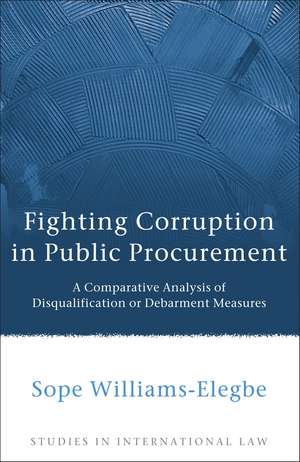Fighting Corruption in Public Procurement: A Comparative Analysis of Disqualification or Debarment Measures: Studies in International Law
Autor Sope Williams-Elegbeen Limba Engleză Hardback – 5 noi 2012
Din seria Studies in International Law
- 34%
 Preț: 511.07 lei
Preț: 511.07 lei - 30%
 Preț: 538.77 lei
Preț: 538.77 lei - 23%
 Preț: 249.26 lei
Preț: 249.26 lei - 34%
 Preț: 512.30 lei
Preț: 512.30 lei - 21%
 Preț: 275.26 lei
Preț: 275.26 lei - 30%
 Preț: 570.51 lei
Preț: 570.51 lei - 30%
 Preț: 571.24 lei
Preț: 571.24 lei - 30%
 Preț: 598.45 lei
Preț: 598.45 lei - 18%
 Preț: 297.20 lei
Preț: 297.20 lei - 30%
 Preț: 573.05 lei
Preț: 573.05 lei - 30%
 Preț: 1138.79 lei
Preț: 1138.79 lei -
 Preț: 448.37 lei
Preț: 448.37 lei - 30%
 Preț: 571.34 lei
Preț: 571.34 lei - 28%
 Preț: 406.31 lei
Preț: 406.31 lei - 21%
 Preț: 270.97 lei
Preț: 270.97 lei - 30%
 Preț: 570.43 lei
Preț: 570.43 lei - 30%
 Preț: 836.82 lei
Preț: 836.82 lei - 14%
 Preț: 570.43 lei
Preț: 570.43 lei - 30%
 Preț: 512.37 lei
Preț: 512.37 lei - 30%
 Preț: 511.14 lei
Preț: 511.14 lei - 30%
 Preț: 954.11 lei
Preț: 954.11 lei - 30%
 Preț: 572.47 lei
Preț: 572.47 lei - 30%
 Preț: 603.73 lei
Preț: 603.73 lei - 30%
 Preț: 779.50 lei
Preț: 779.50 lei - 14%
 Preț: 837.54 lei
Preț: 837.54 lei - 30%
 Preț: 898.78 lei
Preț: 898.78 lei - 30%
 Preț: 576.40 lei
Preț: 576.40 lei - 30%
 Preț: 719.91 lei
Preț: 719.91 lei - 30%
 Preț: 599.66 lei
Preț: 599.66 lei - 12%
 Preț: 233.46 lei
Preț: 233.46 lei - 30%
 Preț: 779.50 lei
Preț: 779.50 lei - 30%
 Preț: 570.43 lei
Preț: 570.43 lei - 14%
 Preț: 779.09 lei
Preț: 779.09 lei - 30%
 Preț: 540.38 lei
Preț: 540.38 lei - 30%
 Preț: 573.86 lei
Preț: 573.86 lei - 14%
 Preț: 574.92 lei
Preț: 574.92 lei - 28%
 Preț: 500.25 lei
Preț: 500.25 lei - 30%
 Preț: 542.02 lei
Preț: 542.02 lei - 30%
 Preț: 778.12 lei
Preț: 778.12 lei - 30%
 Preț: 540.48 lei
Preț: 540.48 lei - 30%
 Preț: 570.43 lei
Preț: 570.43 lei - 30%
 Preț: 515.24 lei
Preț: 515.24 lei - 30%
 Preț: 573.70 lei
Preț: 573.70 lei - 30%
 Preț: 720.23 lei
Preț: 720.23 lei - 30%
 Preț: 784.00 lei
Preț: 784.00 lei - 22%
 Preț: 571.24 lei
Preț: 571.24 lei - 14%
 Preț: 779.09 lei
Preț: 779.09 lei - 30%
 Preț: 779.91 lei
Preț: 779.91 lei
Preț: 951.94 lei
Preț vechi: 1106.91 lei
-14% Nou
Puncte Express: 1428
Preț estimativ în valută:
182.16€ • 190.66$ • 151.61£
182.16€ • 190.66$ • 151.61£
Carte tipărită la comandă
Livrare economică 31 martie-14 aprilie
Preluare comenzi: 021 569.72.76
Specificații
ISBN-13: 9781849460200
ISBN-10: 1849460205
Pagini: 356
Dimensiuni: 156 x 234 x 21 mm
Greutate: 0.68 kg
Ediția:New.
Editura: Bloomsbury Publishing
Colecția Hart Publishing
Seria Studies in International Law
Locul publicării:London, United Kingdom
ISBN-10: 1849460205
Pagini: 356
Dimensiuni: 156 x 234 x 21 mm
Greutate: 0.68 kg
Ediția:New.
Editura: Bloomsbury Publishing
Colecția Hart Publishing
Seria Studies in International Law
Locul publicării:London, United Kingdom
Caracteristici
This book examines the issues and challenges raised by the debarment or disqualification of corrupt suppliers from public contracts.The book compares and contrasts the legal, practical and institutional approaches to the issue in the European Union, the United Kingdom, the United States, the Republic of South Africa and the World Bank.
Notă biografică
Sope Williams-Elegbe is a Research Fellow at Stellenbosch University, South Africa, a public procurement consultant and former lecturer at University of Nottingham.
Cuprins
1: Introduction 2: Corruption, Anti-Corruption Measures and Disqualification 2.1 Introduction 2.2 The Meaning, Nature and Effects of Corruption 2.3 Anti-Corruption Measures 2.4 Public Procurement And Corruption 2.5 The Use of Disqualifications in Public Procurement3: An Overview of Procurement Regulation, Anti-Corruption and Disqualification Policy in the Jurisdictions 3.1 Introduction 3.2 The European Union 3.3 The United Kingdom 3.4 The United States 3.5 The World Bank 3.6 South Africa 4: The Offences and the Requirement for a Conviction for Disqualification 4.1 Introduction 4.2 The European Union 4.3. The United Kingdom 4.4 The United States 4.5 The World Bank 4.6 South Africa 4.7 Summary and Analysis of Main Issues 5: Procedural Issues Affecting Disqualification 5.1 Introduction 5.2 Procedure for Disqualifying 5.3 Time Limits for Disqualification 5.4 Summary and Analysis of Main Issues 6: Disqualifying Entities and the Scope of Disqualification 6.1 Introduction 6.2 Disqualifying Entities 6.3 The Scope of Disqualification 6.4 Summary and Analysis of Main Issues 7: Investigations 7.1 Introduction 7.2 The Existence of a Requirement or Obligation to Investigate 7.3 The Entity with the Power to Investigate and the Extent of the Entity's Powers 7.4 The Nature and Sources of Information and Evidence 7.5 Summary and Analysis of Main Issues 8: The Disqualification of Persons Related to a Corrupt Supplier 8.1 Introduction 8.2 Rationales for Disqualifying Related Persons 8.3 The Related Persons 8.4 Summary and Analysis of Main Issues 9: The Effect of Disqualification on Existing Contracts 9.1 Introduction 9.2 Rationales for Contractual Termination 9.3 Is There a Duty to Terminate Existing Contracts for Disqualification? 9.4 Problems with Contractual Termination 9.5 Summary and Analysis of Main Issues 10: Derogating from Disqualification 10.1 Introduction 10.2 Reasons for Derogating from Disqualification 10.3 Preventing Abuse in the Use of Derogations 10.4 Summary and Analysis of Main Issues 11: Remedies for Affected Suppliers 11.1 Introduction 11.2 The Availabilty of a Right of Review 11.3 The Kinds of Remedies Available 11.4 Summary and Analysis of Main Issues
Descriere
This book examines the issues and challenges raised by the debarment or disqualification of corrupt suppliers from public contracts, comparing and contrasting the legal, practical and institutional approaches to the implementation of the disqualification.
